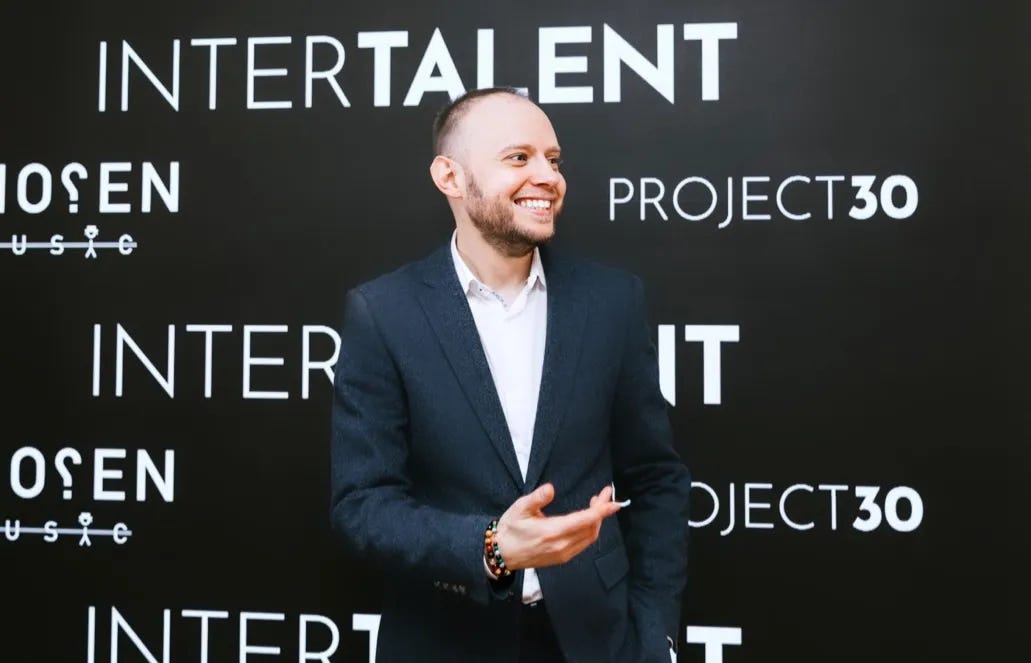Is 2024 the year Talent Agencies value data as much as creativity?
Alex is the Managing Director of major UK talent agency InterTalent. He represents his clients alongside overseeing the agency's creative strategy, day-to-day operations & acquisitions.
Hi! Please share this post with anyone who is interested in the inner workings of a Talent Agent. If you are not already a subscriber, please sign up and join everyone who receives Dealmakers straight to their inbox. It’s free, which is not a word that an Agent uses often.
If you’ve missed my previous blogs about Talent Agents, just head here to catch up. I’ve written about why you need an agent, what makes a great one, the art of dealmaking and much more.
🤔 Is 2024 the year Talent Agencies value data as much as creativity?
After proudly landing in the Jewish News’s Top 20 Media & Creative under 40 list (yes, I am still under 40…), I was asked to hop on the Talent Talks podcast to discuss my recruitment strategy at InterTalent. Normally I get asked on pods to discuss celebrities or the entertainment industry at large but I’ve never been asked to talk about being an MD. Running a talent agency of 47 staff who work across 10 different aspects of the business. While I don’t often get asked how I hire staff, I do often get asked what the biggest change is from being an Agent to running the Agency. There are many things, but more than anything else I never thought I’d be looking at as many spreadsheets as I do. Microsoft Excel didn’t open all that often before becoming Managing Director. Now, not only is it open 24/7 but it has multiple spreadsheets at all times telling me pieces of information that can help me and my fellow Company Directors to make decisions and plan for the future.
As an Agent I relied heavily on knowledge, relationships, creativity and my gut. As an MD, I still have to rely on all those things… but now I also rely on spreadsheets.
A talent agency represents talented people who work within the creative arts. Creativity is at the heart of what we do. We spend our lives representing people who want to be seen and heard for their skills, creativity and talent. Yes, everyone wants to make money too but if we wanted to go into a business purely for money I definitely wouldn’t recommend this one. I’d head straight to the City and see what a global Bank might offer. In entertainment, the money usually comes later.
However, quietly, there’s been an analytics revolution in entertainment and I don’t just mean finally getting to see Netflix’s viewing stats. Everyone we work with uses data to decide what talent to use, where to put them and how much to spend on them. Publishers make book offers based on data from their sales team. Brands make partnership offers based on engagement and demographics. Theatre producers gauge star power based on social platforms. Not only does it dictate who they cast but also how big their name is on the poster. And so on.
Now it’s our turn.
At InterTalent, we’ve committed to focusing strongly on data—understanding what it reveals, where it can guide us, and why it’s immensely beneficial for our clients.
Today, I’m going to lay out why talent agencies should be focusing heavily on data and how it enhances creativity.
Let’s go! ⬇️
As I mentioned in my previous blog about brand partnerships, in a market slowdown talent agencies have two choices: persevere and risk failure or pivot to embrace cultural shifts and pursue profitable growth areas. We want to represent the most creative talent in the country and ensure that their projects are as successful as possible. Sometimes that results in bigger and smaller objectives. That’s ok. Not everything has to be the next Chicken Shop Date or Baby Reindeer straight away, and we are there to nurture our development talent so that one day they will have a massive hit on their hands. There will always be more excitement in developing a client’s career from the start than signing them at their height.
A talent agency is a business. It needs a strong amount of income to run so we must focus on where we can have big wins too. A talent agency that doesn’t make money won’t be a talent agency for long. The finances have to add up and if an area of the industry shows high profitability and is visibly expanding, we need to grab it with both hands.
I am now using the data that my finance team regularly pulls together for me to help guide our focus, make better decisions and push our clients towards what the buyers want.
Whenever I mention that we now focus heavily on data, I am also asked ‘what about creativity?’. Well, this boosts creativity. A million ideas are great. But what’s the one idea we should focus on? What’s the idea that we know people want? What’s the idea that has a chance of getting attention? Who might want it?
More Information ➔ More Focus on What Works
More Focus on What Works ➔ More Refined Creativity
More Refined Creativity ➔ More Chance of Success
Creativity by numbers rarely works. I’ll give you that. But giving our talent and agents enough information that they can then focus on specific areas of the industry is extremely important in a market where opportunities are dwindling and less chances are being taken by those who make decisions.
👀 Here’s the data that’s important to me:
What types of projects make us the most money? Brands? TV Presenting? TV Guest Appearances? Books? Podcasts? Theatre?
What kind of clients get booked more than others? Actors? Presenters? Gamers? Comedians?
Is there a correlation between those who make the most and their engagement demographics? Age? Gender? Location? Content?
Which partners are booking our talent the most often?
Which clients are struggling based on all of the above?
Where can we see an upward trajectory in niche areas finding an audience and does anyone in our current roster fit that world?
Who is getting the jobs when our clients don’t and what does that tell us about where the work is?
…and, ultimately, what works and doesn’t work for our talent agency when we’re thinking about what makes an InterTalent client and what kind of clients we wish to represent.
With the tightening of budgets and industry upheaval, you have to be more laser-focused than ever before. With all of the data that you can collate through every job booked, you can get an extremely accurate assessment of what is important to your talent agency. You can sit down as a team, digest this information, use it to inform talent strategies and then guide clients in the best direction which gives them the best chance of success. That’s what we care about. Getting seen. Getting heard. Getting paid.
➡️ As crucial as it is for our clients, it is equally important when running a talent agency. Here’s why:
✅ Informed Decision Making: While creative freedom is essential for all our talent, using data ensures that their vision is in sync with market demand. Being an agent has always been about balancing creativity and business. This is just rocket fuelling it.
✅ Competitive Advantage: Talent agencies are very competitive. There’s no hiding from that. It’s a small industry. We want to continue to be ahead of the curve, quicker, smarter and prove why we’re the go-to destination for the best talent. Data gives us all the tools we need to ensure that happens.
✅ Audience Engagement: Understanding audience behaviour through data helps us tailor our talent strategies, ensuring our clients remain relevant and forward-thinking. We’re in the audience business… so we need to know what the business wants.
✅ Taking Risks: As the MD of a top talent agency, I spend a lot of time debating which risks to take and not take. We have excelled as an agency and pushed forward from 3 divisions to 9 divisions and a production company in just 4 years because of big risks in hiring, signing, marketing and opportunities. Take the risk. Hope for the reward. It won’t always happen but if you wait for the reward to show before taking a risk it’ll never happen. You have to take risks to push forward.
✅ Resource Allocation: I keep an eye on our P&L at all times. I have to allocate our expenditure to areas that can grow our agency. That’s in recruitment, our Soho office, our marketing, events, PR… every penny out of the company is a penny towards a bigger victory. Having as much information as possible allows me to allocate resources in the smartest way possible.
✅ Accurate Talent Strategies: It helps us plan even stronger talent strategies for each talent. Not only can we identify the best opportunities but it also helps us to explain and show why we should.
✅ Measuring Success: Ultimately, I have to report to my board of directors. I have to clearly explain why I decided to move forward with certain things. Data allows me to track the success of my decisions, and through positive results, gain even more support and trust from the whole team at InterTalent who work super hard to action the creative vision I put in place for the company when I took over in 2020.
Data can be hugely impressive, it’s reassuring and gives us the comfort that we’re focusing on the right things. It’s not bulletproof. It doesn’t work 100% of the time and we all yearn for that big hit that takes the industry by surprise. Creativity is the thing that people remember. No one who loves art or entertainment will ever truly care more about spreadsheets but by combining the access we have to key information along with the creative power of our clients, talent agencies can uplift the representation of their roster tenfold.
Need to catch up on previous blogs? Try some of these…
🤔 What makes a great Talent Agent?
🤔 Should the biggest talent need an Agent?
🤔 What does an Agent actually do?
🤔 What are the secrets of dealmaking?
📥 I would love to hear from you. Any ideas, thoughts and feedback via alex@intertalentgroup.com are always most welcome.
Please subscribe if you don’t already and tell your friends.
See you next time.
Alex





